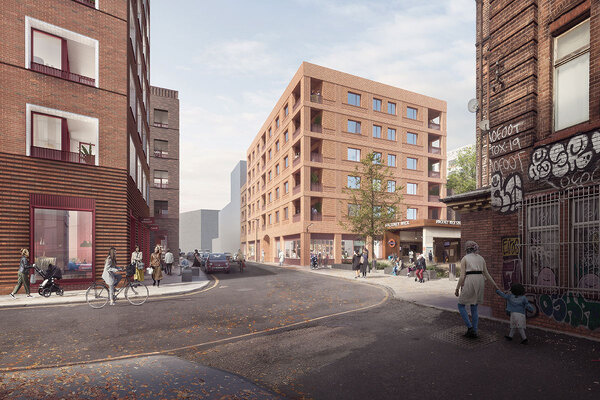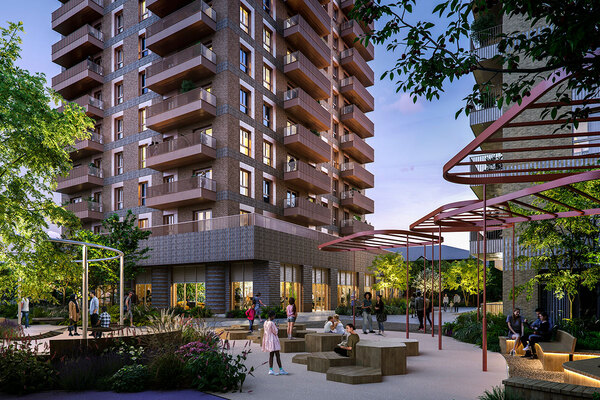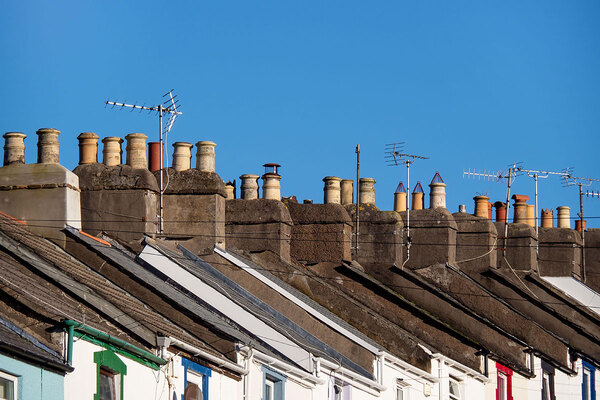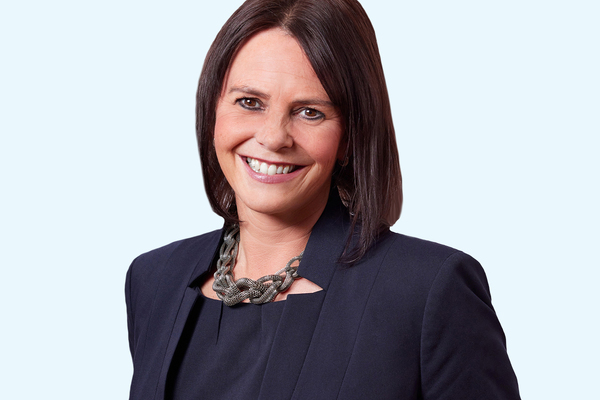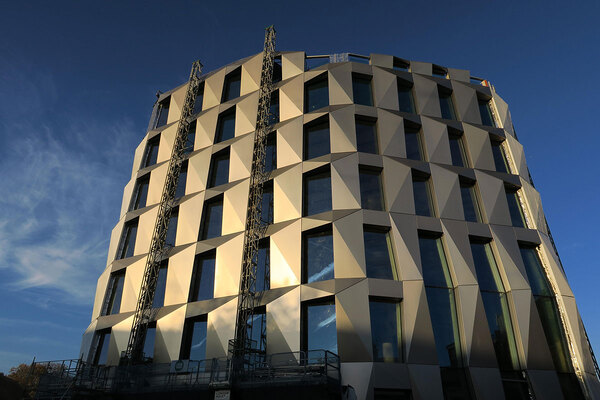Introducing Dr Earth
‘Ethical landlord’ and UKIP housing spokesperson Andrew Charalambous is one of the more colourful characters in politics. Here, the month after his party took 147 council seats across the country, he tells Kate Youde where the coalition is going wrong
There is no shortage of things to talk about with Andrew Charalambous. Pre-interview research throws up a broad and eclectic CV: he is a qualified barrister, a property developer and a former special constable; an ex-fruitarian (he’s now vegetarian); he has gone by the name of ‘Dr Earth’, and has written on the parallels between Plato’s utopia and Spartan society.
Oh, and he is the UK Independence Party’s housing spokesperson.
This may come as news to many people. A straw poll of housing bosses ahead of the interview reveals the sector to be in the dark about UKIP’s views on housing, let alone the man charged with presenting them. Yet he and his party matter, having been the story of England’s local elections last month when UKIP won 147 seats, up from eight.
Although Mr Charalambous and his colleagues are unlikely to be striding triumphantly into Downing Street in May 2015, their policies and how the more established parties respond to them may well be crucial in determining who is the next prime minister. So who is Mr Charalambous and what are his party’s housing policies?
The first thing I notice about the 45-year-old private landlord is his lateness. When I call to check everything is OK, it transpires he has ‘forgotten’ the interview. Minutes later, he calls back to claim he has mixed up Inside Housing with a ‘French magazine’. Either way, he is nearly 50 minutes behind schedule when he finally breezes in with a limp handshake by way of greeting.
Green ambitions
We meet – two weeks after UKIP’s local elections success – at Surya, a bar in which he is a shareholder that was set up in 2008 below flats he owns in London’s King’s Cross. Tired wooden signs by the door proclaim it to be ‘the world’s first ever ecological club’; in fact it is now more of a live music venue and not as ecological as it once was. Its centrepiece green feature, a piezoelectric dance floor that used clubbers’ movements to generate electricity, was removed last year to create more space. There are, however, still solar panels and wind turbines on the roof.
The venue, which boasts a chandelier made from pens, sometimes hosts UKIP parties. I note there aren’t any beers on tap, so what can party leader Nigel Farage (rarely pictured without a pint in hand) drink? ‘Plenty,’ retorts Mr Charalambous, laughing.
This comes after the first of many gushing asides in praise of his political boss, who he first met when he was considering defecting from the Conservative Party, something he did in early 2011 before a failed bid later that year to become a UKIP MP (see box: Switching sides).
‘Compared to any other politician I’ve met, one thing which is very nice about Nigel, very positive, is he’s very sociable, very human,’ says Mr Charalambous, dressed in a suit and red tie with UKIP’s name in yellow stitching. ‘There is no distance between him and the people he engages with… He’s got that passion for people.’ With typical political timing this conversation takes place a few hours before Mr Farage is forced to seek refuge in an Edinburgh pub after being confronted by protestors.
The walls of the bar feature environmental slogans such as, ‘the production and use of energy is the leading source of humanity’s greenhouse gas emissions’. This seems rather odd considering that the UKIP housing policy document he shared with me ahead of the interview states that ‘the framework upon which the green deal [a government energy efficiency scheme] is framed – namely, that carbon emissions are overwhelmingly responsible for climate change – is open to question’.
So how do the personal green ambitions of Dr Earth – a moniker by which Mr Charalambous says he was first called in an interview with Channel 4 and was used by others for PR purposes, though he too has used it – fit with his party’s environmental views?
Conflicting views
‘That’s the beauty of UKIP,’ he tells me, perched on a stained, beige sofa next to some fake fronds. ‘We are a broad church and there are two schools of thought. There are those who, as you rightly say, believe that climate change isn’t real and, if it is real, other factors are responsible… But we can’t deny that we are destroying the planet.’ There are people with different views in every party, he adds.
There are a couple of things on which the party does seem to agree: for the UK to withdraw from the European Union and curb immigration. Both, inevitably, feed into UKIP’s housing policy.
‘The significant difference between us and the other parties [is] that we are more demand conscious,’ he says. ‘For decades, government after government has set house building targets they’ve never met and they are never going to meet.’

He claims population figures are inaccurate, so the country’s housing needs are even greater than we think. ‘The problem is, the best way to meet those housing needs is to have a market which is, number one, responsive to demand to create the supply.’
The first role of the government is to facilitate the market, he suggests. The British banks – some bailed out by the taxpayer – are ‘not lending far and fast enough’ to developers or mortgages to people who can afford them but can’t get access to lending.
He also says the biggest pressure on housing demand is immigration. ‘Nine out of 10 new properties which have been built, as I understand it, are going to people who’ve come from abroad,’ he says, claiming it is a ‘known statistic’ but he is unable to tell me the source. In fact, recent research from Knight Frank found that UK buyers accounted for 27 per cent of transactions in the new build market in central London in 2012.
He doesn’t think it’s easier for immigrants to access social housing but says ‘people are feeling that certain people who are coming here are jumping the queue’. According to Communities and Local Government department statistics, 9 per cent of new social housing tenants in 2011/12 were non-UK nationals.
Mr Charalambous says immigration is part of British culture – his Greek Cypriot father fought for Britain in World War II and settled in the UK – and that there is no conflict with people ‘bringing energy to the economy’.
‘There is an issue though when people are coming here taking advantage of the benefit system, when people are coming here at a time when really we do have a serious housing crisis, and then expecting somehow government housing targets to constantly be reacting to the level of people coming here when not enough is being done to curb the level of immigration,’ he says.
‘It is not a question of race; it is a question of space though, and we have to be realistic about that.’
Development
He argues there are two reasons why previous affordable house building targets have failed: because they tried to concentrate developments in particular areas – ‘so you had these super building idea schemes of reproducing Milton Keynes a thousand times in the UK, which has never worked’ – and because developers cannot be expected to invest to build if it does not make financial sense.
If UKIP were to win power, he would propose to Mr Farage taking away the ‘social housing tariff’ (planning gain agreements requiring developments to contain a certain number of affordable homes), which he argues has failed by preventing more house building because developers want to respond to the market, not local authorities. He says non-affordable housing developers have to partake in the affordable housing market whereas, in itself, there is ‘enough incentive for others who are maybe not luxury home developers to build affordable housing’.
‘This idea of affordable housing is also a bit demeaning because it’s kind of saying, “we’ll do a nice development but you’ve got to do [he breaks into laughter] a few less nice things for other people”. The reality is when they develop their 14 flats, the ones that are going to go to social housing are not going to be as luxurious as the other 10. That’s the reality of the market. What we need to be saying is people should be allowed to produce their own affordable housing developments and that’s what the government should be incentivising financially.’
UKIP would, according to Mr Charalambous, engage the City of London and issue bonds to permit affordable housing development. It would also unify the planning and building control departments in local authorities and ‘fast-track’ planning for affordable housing through a national affordable housing planning authority.
‘I think we need to look at the two things [affordable and non-affordable housing developments] separately,’ he says. ‘We’re asking farmers to become butchers and butchers to become farmers, and it is to do with the government not really understanding the housing market.’
But is there a danger of creating ghettos by separating developments?
‘We at UKIP believe in community-sized housing,’ he explains. ‘Those estates… shouldn’t involve more than 50 households. They should be self-contained… Every estate should have a warden, usually somebody who’s perhaps an ex-police officer, which would encourage the commercialisation of the estates… We are against the high-rise; we are against the big developments… because that’s where you would get the ghettoisation.’
‘Ethical landlord’
Mr Charalambous himself owns ‘many hundreds’ of properties in London, which he describes as ‘affordable housing’ because many tenants claim what he terms ‘London housing allowance’ (he means local housing allowance) and he does not charge deposits. UKIP would stop direct payment of LHA to tenants, which Mr Charalambous says is turning landlords away from affordable housing because of the risk of arrears.
Is there a danger of a conflict of interest in him helping write UKIP’s housing policy when he is such a big landlord? ‘It’s a good thing having somebody who actually is in touch and is actually an ethical landlord and understands it from that side of the equation, because too often the people who write these kind of policies aren’t really in the market, so it all becomes very academic.’
Anyway, he says, the majority of his tenants are from overseas so he wouldn’t benefit from a curb in immigration. ‘But I think it’s the right thing to do,’ he adds. ‘I think politics is a vocation. If you really want to do the politics thing, I think you need to understand that it’s [a] sacrifice.’
He remains undecided about his political future – his immediate plans involve a ‘romantic escape’ to the Caribbean to marry Maria, his girlfriend of nine months – but he plans to stand for election again. Before he does so, he may want to gain some of that ‘passion for people’ he so admires in Mr Farage. As I go to shake his hand on leaving, he barely touches my palm and does not even look up from his mobile phone.
Switching sides
A Conservative Party member since the age of about 14, Andrew Charalambous stood twice for the Tories in local elections and twice in general elections, most recently in Edmonton in 2010 when he finished second. He was in the £50,000-a-year Leader’s Group, the perks of which included dinners with David Cameron, and was a party donor.
Election Commission records show he made a non-cash donation of £142,319.80 in late 2009 to the Edmonton branch for advertising, printing and other campaigning. This followed a £3,520 donation to Oxford West & Abingdon in the form of consultancy services at the beginning of 2009.
Mr Charalambous defected to the UK Independence Party in early 2011, feeling certain parts of the Conservative Party were ‘totally disconnected from the people and… traditional values’. He finished fourth in the Feltham and Heston by-election for UKIP in December that year.

